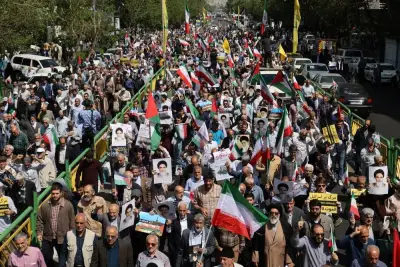The United Nations yesterday warned Israeli Prime Minister Benjamin Netanyahu that his plan to annex the Jordan Valley in the occupied West Bank if re-elected would have no “international legal effect.”
Netanyahu issued the deeply controversial pledge as he gears up for September 17 elections.
He also said Israel would move to annex Israeli settlements throughout the West Bank.
Such moves could effectively kill any remaining hopes for a two-state solution to the Israeli-Palestinian conflict, long the focus of international diplomacy.
“The secretary-general’s position has always been clear: unilateral actions are not helpful in the peace process,” UN spokesman Stephane Dujarric said.
“Any Israeli decision to impose its laws, jurisdictions and administration in the occupied West Bank is without any international legal effect,” the spokesman added.
“Such a prospect would be devastating to the potential of reviving negotiations, regional peace, and the very essence of a two-state solution.”
The Jordan Valley accounts for around one-third of the West Bank, which Israel occupied in the 1967 Six-Day War — a move never recognised by the international community.
Earlier, Netanyahu issued a deeply controversial pledge to annex the Jordan Valley in the occupied West Bank if re-elected. Palestinians immediately reacted by saying Netanyahu was destroying any hopes for peace, while his electoral opponents accused him of a cynical play for right-wing nationalist votes with polls only a week away.
In his televised speech, the prime minister also reiterated his intention to annex Israeli settlements in the wider West Bank if re-elected.
But he said he would do that in co-ordination with US President Donald Trump, whose long-awaited peace plan is expected to be unveiled sometime after the vote. “There is one place where we can apply Israeli sovereignty immediately after the elections,” Netanyahu said during the address that included a map of the Jordan Valley on an easel next to him. “If I receive from you, citizens of Israel, a clear mandate to do so...today I announce my intention to apply with the formation of the next government Israeli sovereignty over the Jordan Valley and northern Dead Sea.”
DESTROYING ‘ALL
CHANCES OF PEACE’
Senior Palestinian official Hanan Ashrawi said Netanyahu was “not only destroying the two-state solution, he is destroying all chances of peace”. She called it “worse than apartheid”. Saeb Erekat, the chief Palestinian negotiator, said the annexation would be “manifestly illegal” and called on the international community to act.
Jordan’s Foreign Minister Ayman Safadi warned the move would “push the whole region towards violence”. Safadi said the “unilateral measures he (Netanyahu) proposes risk killing off the entire peace process and pose a threat to peace and security in the region”.
Meanwhile, Arab foreign ministers condemned Netanyahu’s plan. Netanyahu’s plan will undermine any chances of progress in the Israeli-Palestinian peace process, Ahmed Aboul Gheit told reporters after a one-day meeting of Arab foreign ministers in Cairo.
Israeli settlements are located in what is known as Area C of the West Bank, which accounts for some 60% of the territory, including the vast majority of the Jordan Valley. Netanyahu said his annexation plans would not include Palestinian cities, such as the Jordan Valley’s Jericho, though it would be encircled by Israeli territory.
The premier, who used a map of the Jordan Valley to illustrate his plans, said Trump’s peace parameters “will place before us a great challenge and also a great opportunity”. “This is a historic, one-time opportunity to apply Israeli sovereignty on our settlements...and other places of importance to our security, our heritage and our future.”
Trump has thrown US support overwhelmingly in favour of Israel since taking office, including by recognising Jerusalem as Israel’s capital and cutting hundreds of millions of dollars in aid to the Palestinians.
Ahead of April elections, Trump recognised Israeli sovereignty over the occupied Golan Heights, seized from Syria in the 1967 Six-Day War. It is unclear if Trump, who made clear before April’s vote that he would like to see Netanyahu win, will follow up with any further expressions of support before next week’s election. Netanyahu along with his right-wing and religious allies won a majority of seats in April polls, but he failed to form a coalition and opted for an unprecedented second election in five months.
He is again facing a difficult challenge from ex-military chief Benny Gantz and his centrist Blue and White alliance.
Gantz, who has in the past spoken of keeping the Jordan Valley under Israel’s control forever, said “I have no doubt that this will be yet another empty promise because there is nothing behind it”. “In a week from now, we will replace this spin with actions and deeds,” he said.
Right-wing nationalist votes will be key to Netanyahu’s efforts to continue his reign as Israel’s longest-serving prime minister.
“We understand that the prime minister has said that (annexation) is the carrot of Trump’s plan, the question that remains is what is the stick, what will we have to give?” asked former justice minister Ayelet Shaked, who heads a union of far-right parties.

File photo shows a Palestinian man offering water to goats and sheep in Jordan Valley in the occupied West Bank.


